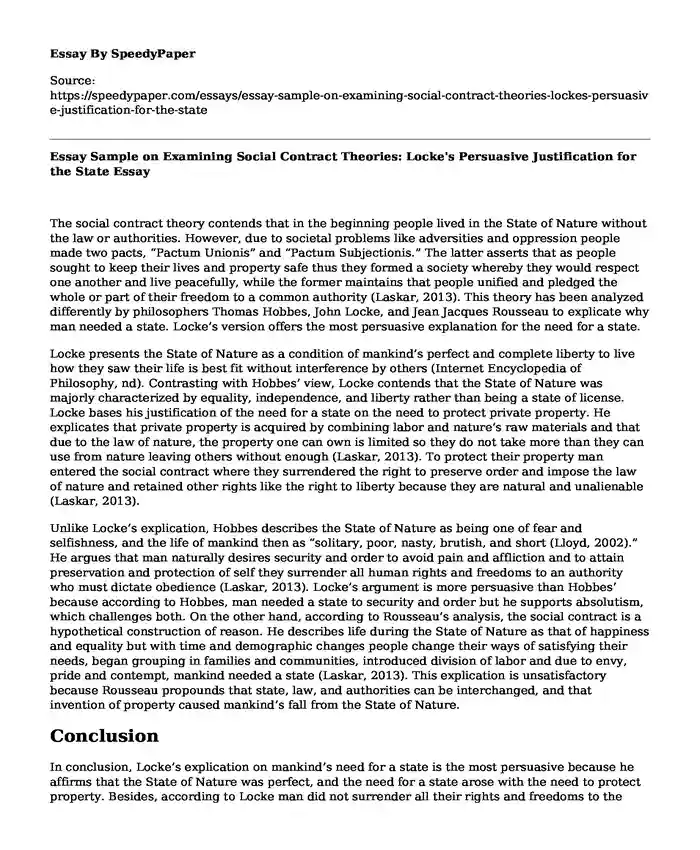
| Type of paper: | Essay |
| Categories: | Sociology Law Philosophy |
| Pages: | 3 |
| Wordcount: | 687 words |
The social contract theory contends that in the beginning people lived in the State of Nature without the law or authorities. However, due to societal problems like adversities and oppression people made two pacts, “Pactum Unionis” and “Pactum Subjectionis.” The latter asserts that as people sought to keep their lives and property safe thus they formed a society whereby they would respect one another and live peacefully, while the former maintains that people unified and pledged the whole or part of their freedom to a common authority (Laskar, 2013). This theory has been analyzed differently by philosophers Thomas Hobbes, John Locke, and Jean Jacques Rousseau to explicate why man needed a state. Locke’s version offers the most persuasive explanation for the need for a state.
Locke presents the State of Nature as a condition of mankind’s perfect and complete liberty to live how they saw their life is best fit without interference by others (Internet Encyclopedia of Philosophy, nd). Contrasting with Hobbes’ view, Locke contends that the State of Nature was majorly characterized by equality, independence, and liberty rather than being a state of license. Locke bases his justification of the need for a state on the need to protect private property. He explicates that private property is acquired by combining labor and nature’s raw materials and that due to the law of nature, the property one can own is limited so they do not take more than they can use from nature leaving others without enough (Laskar, 2013). To protect their property man entered the social contract where they surrendered the right to preserve order and impose the law of nature and retained other rights like the right to liberty because they are natural and unalienable (Laskar, 2013).
Unlike Locke’s explication, Hobbes describes the State of Nature as being one of fear and selfishness, and the life of mankind then as “solitary, poor, nasty, brutish, and short (Lloyd, 2002).” He argues that man naturally desires security and order to avoid pain and affliction and to attain preservation and protection of self they surrender all human rights and freedoms to an authority who must dictate obedience (Laskar, 2013). Locke’s argument is more persuasive than Hobbes’ because according to Hobbes, man needed a state to security and order but he supports absolutism, which challenges both. On the other hand, according to Rousseau’s analysis, the social contract is a hypothetical construction of reason. He describes life during the State of Nature as that of happiness and equality but with time and demographic changes people change their ways of satisfying their needs, began grouping in families and communities, introduced division of labor and due to envy, pride and contempt, mankind needed a state (Laskar, 2013). This explication is unsatisfactory because Rousseau propounds that state, law, and authorities can be interchanged, and that invention of property caused mankind’s fall from the State of Nature.
Conclusion
In conclusion, Locke’s explication on mankind’s need for a state is the most persuasive because he affirms that the State of Nature was perfect, and the need for a state arose with the need to protect property. Besides, according to Locke man did not surrender all their rights and freedoms to the authorities, rather, they surrendered the rights to maintain order and enforce the law of nature. Hobbes’s analysis is amiss because he describes the State of Nature as miserable and the need for a state as an escape from affliction. During the State of Nature there were plenty of natural resources and without restrictions and people lived fairly and freely. Lastly, Rousseau’s explanation is not functional because although he supports the sovereignty of the people, he proposes that the invention of the property was man’s downfall and that the state, law, and the authority can be interchanged. Oppositely although the authorities can be overruled the state cannot because it exists even without the authorities.
References
Laskar, E., M. (2013). Summary of Social Contract Theory by Hobbes, Locke, and Rousseau. https://poseidon01.ssrn.com/delivery.php?ID=619020093024127102124111017102115123102005063047062066086000021112083094091089092088027001040125108012013088009087086106121028021052054085039026070077093013120004004026085039007014083017118001004029116031001100019030029000009017005002096099111105005001&EXT=pdf
Internet Encyclopedia of Philosophy. (2020, July 22). Social Contract Theory. https://www.iep.utm.edu/soc-cont/
Lloyd, S., A. (2002). Hobbes’s Moral and Political Philosophy. Stanford Encyclopedia of Philosophy. https://plato.stanford.edu/entries/hobbes-moral/?PHPSESSID=764cd681bbf1b167a79f36a4cdf97cfb
Cite this page
Essay Sample on Examining Social Contract Theories: Locke's Persuasive Justification for the State. (2023, Oct 18). Retrieved from https://speedypaper.com/essays/essay-sample-on-examining-social-contract-theories-lockes-persuasive-justification-for-the-state
Request Removal
If you are the original author of this essay and no longer wish to have it published on the SpeedyPaper website, please click below to request its removal:
- Survey Questions
- Free Essay on Charter of Human Rights and Responsibilities 2006
- Free Essay Sample on Social Theories of Religion
- Ethical Police Administration, Essay Example for Students
- Essay Sample on Criminal Law: Exclusionary Rules
- Free Essay: Alarming Policing Issues
- Addressing Educational Inequality, Controversies in Sex Education, and Solutions for Housing Segregation in the USA
Popular categories




